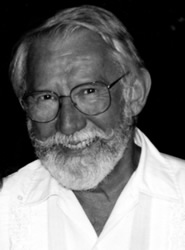

|

|
IN MEMORIAM
Blake Lee Spahr
Professor of German and Comparative Literature, Emeritus
UC Berkeley
1924 – 2006
Blake Lee Spahr, an emeritus professor of German and comparative literature at the University of California, Berkeley, died on September 29, 2006 at the age of 82.
Spahr, an internationally known scholar and editor of German Baroque and comparative Arthurian literature, joined the faculty of the UC Berkeley Department of German in 1955 to teach seventeenth-century literature. He chaired that department and the Department of Comparative Literature during the 1960s and 1970s and helped institute Berkeley’s Dutch language and literature program. Later he was instrumental in establishing the Queen Beatrix Chair in Dutch Literature and Culture.
Having taught himself Welsh, Spahr offered courses on that language and strongly supported the founding of the Celtic Studies Program at Berkeley. He directed the California Study Center of the UC Education Abroad Program at Göttingen. He received a Guggenheim Fellowship in 1962. As a guest professor Spahr taught at the University of Geneva (1961), Northwestern University (1971), University of Colorado (Summer 1959), and the University of Hawaii (1985).
With the outbreak of World War II, Spahr joined the U.S. Army Air Corps and became a navigator of a B-17 bomber. He flew 35 combat missions over Germany between mid-August 1944 and the end of that year, earning the rank of a decorated first lieutenant. After completion of 35 missions, the Air Corps sent him to Paris as a translator.
A native of Carlisle, Pennsylvania, Spahr earned a B.A. in German at Dickinson College and later attended Yale University, where he earned his M.A. and Ph.D. degrees in German literature with a focus on seventeenth-century Baroque literature.
As a postdoctoral student, Spahr spent a year in Nuremberg, where he gained access to the archives of the Pegnesischer Blumenorden, a literary society founded in 1644 and devoted to Baroque literature. He became its only American member. His first book was The Archives of the Pegnesischer Blumenorden. A Survey and Reference Guide (1960).
Spahr did most of his research at the Herzog August Library in Wolfenbüttel, Germany, which was the largest library in the seventeenth century. “Baroque research was in its infancy in the late ‘50s, and Blake was usually the only one in the reading room at the time,” said Herlinde Spahr, his wife and fellow Germanist. “He often received fellowships for his research there, and he once said that he must have spent nearly one-fifth of his life in Wolfenbüttel.”
Spahr received the Air Medal from the U.S. government for fighting the Germans in World War II, and then in 1985, in an ironic twist that always caused a smile on his face, the Federal Republic of Germany recognized his contributions to German culture by awarding him the Bundesverdienstkreuz, Erster Klasse, Germany’s highest civilian honor.
Among Blake’s academic honors were a Festschrift presented by an international array of distinguished colleagues and former students, ironically entitled Barocker Lust-Spiegel [BLS, Spahr’s initials], Studien zur Literatur des Barock (1984) [BLS in reverse]. He was the recipient of the Berkeley Citation for distinguished achievement and for notable service to the University (1992) and was awarded an honorary degree of Doctor of Humane Letters by Dickinson College (2000).
Throughout his academic career, he recognized affinities between the horrors of World War II and the brutalities and cruelties of the seventeenth-century religious wars. In Spahr’s last book, Andreas Gryphius: A Modern Perspective (1993), he wrote: “Who has mirrored the horrors of the holocaust or the rampant starvation with the penetrating cogency of this Baroque poet’s lyrics? … May we not look to this tortured poet, crying out in protest, to give voice to our own torment? Can we not look backward over 300 years of history to find a true voice for our age?”
Among Spahr’s other major publications are Anton Ulrich and Aramena: The Genesis and Development of a Baroque Novel (1966), Problems and Perspectives: A Collection of Essays on German Baroque Literature (1981), and some 120 articles, reviews, and editions on German, Dutch, and French Literature.
Spahr’s contribution to German studies is particularly outstanding as an editor in a field in which he had no equals. He edited the Berner Beiträge zur deutschen Sprache und Literatur (1983-92), as well as the ambitious Neudrucke deutscher Literatur des 17. Jahrhunderts (1983-92). At the same time he served as editor of the Berner Beiträge zur Barockgermanistik (1983-92) and as review editor of Daphnis. For many years Spahr was on the editorial staff of Comparative Literature Journal (Pennsylvania State University Series in German Literature).
After his retirement from UC Berkeley in 1993, Spahr maintained his interest in the arts as an exacting editor, enthusiastic reader and patron of musical and theater arts. He spent 40 years playing flute and French horn in the Oakland Community Orchestra.
Blake’s colleagues all praise him as an effective administrator, a fine teacher and a scholar of great distinction, with a vast knowledge, especially in the areas of German, French and Celtic literatures. He will be missed by them and fellow scholars throughout the world, but especially by his close friends in the Bay Area, to whom he remained loyal to a fault, and they to him. He will not be forgotten.
Blake Lee Spahr is survived by his wife, Herlinde Spahr, of Orinda, and a stepdaughter, Amelia Schaller, of Zurich, Switzerland.
Johan P. Snapper
Frederic C. Tubach